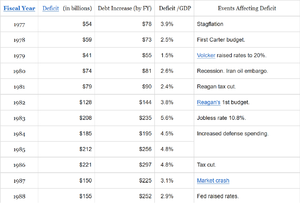No he did not. So-called 'Reagan Era' deficits ramped up to their level in Jimmy's last year. And with Tip O'Neill in the House, they weren't coming down Reagan or Not. .
You better get a book and study. You're right that dippy Tip "W.C. Fields" O'Neil was a major problem. But Jimmy Carter's entire cabinet told him that if he elected Paul Volcker to head the Federal Reserve, he would almost certainly lose the next presidential election. Bert Lance told Carter that Volcker was poison, and that his corrections would cause a tailspin in the economy that would not recover until after the 1980 elections. All of the Democrats wanted to print money to turn down some of the economic misery, and Congress actually chugged a bunch of it through over Carter's veto.
Facing certainty that the move would be harsh, unpopular, but necessary, Carter appointed Volcker. And Reagan kept him until he couldn't stand listening to Volcker harp about Reagan's military deficit spending any longer.
You couldn't get military parts because the money was being spent on handouts.
No, we couldn't get parts because Carter refused to approve extra appropriations that previous presidents had been rubber stamping for the Pentagon since 1965.
Like him or hate him, you better know the truth about someone before you start talking fantasy history. Jimmy Carter's actions were unpopular, but when you take away your kid's maxed out credit card that's pretty unpopular too. But you do the right thing by doing it. Better read up. Jimmy Carter is a great man, and was a good president.
![[H]ard|Forum](/styles/hardforum/xenforo/logo_dark.png)
